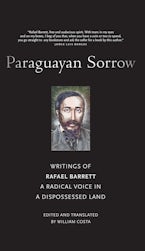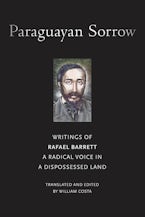"Rafael Barrett, a free and audacious spirit. With tears in my eyes and on my knees I beg of you that when you have a coin or two to spend, that you go straight to any bookstore and ask them to give you something by this author."
~Jorge Luis Borges, Argentine short story writer, essayist, and poet
"Rafael Barrett was a precursor, not only in the sense of one who precedes and goes ahead of his contemporaries, but also in the sense of one who professes and teaches ideas and doctrines that are ahead of his time."
~Augusto Roa Bastos, Paraguayan novelist and short story writer
"To read Barrett is to be inspired by his prose, to feel the depth of his analytical thinking, his immense disdain for injustice, his dedication to defending the most vulnerable, his constant struggle against the powerful, his authentic humanity.
To read his collection Paraguayan Sorrow is to be immersed in a personality brimming with irrepressible strength in the fight for social justice as he describes the veritable slavery of the workers of the yerba mate forests as had never been done before.
William Costa’s excellent introduction will familiarize you with aspects of his short life and the prolific literary work he produced over just the six final years of his unforgettable existence.
"
~Rafael Barrett Viedma, grandson of Rafael Barrett, administrator of the Rafael Barrett Foundation, and key historical member of the Paraguayan Communist Party
"There is very rarely true reparation for crimes committed against entire peoples. Almost never. Perhaps that is why we cling so tightly to our images of Mary, Christ, the saints, and prayer cards. Fortunately, there were—and there still are—writers and others who have looked to reconstruct these devastated peoples through the arts, sciences, and literature. Literature is where Rafael Barrett made the greatest contribution to the history of our mestizo nation.
What is it that Barrett experienced and that moved him to action? What if not the orphanhood and sorrow of a people that had suffered a genocide in the War of the Triple Alliance (1864-1870), the most brutal war in that key period of consolidation of modern, liberal, neocolonial states.
He observed, experienced and narrated the reality of a people whose nation-state, built on the free occupation of public lands by campesino families, had been completely destroyed. With one stroke of the pen, those public lands were handed over to foreign extractivist companies, leaving many families subjected to a regime of slavery.
Paraguay’s railroad was ceded to an English company and its iron foundry, which had been used to make tools, plows, machetes, rifles and ammunition, was left in ruins. This was a clear sign of why they had come to eliminate the Paraguayan people: so that they would never again think of undertaking any industrial or economic process independent of the centers and subcenters of imperialism.
For this reason, this English edition of Paraguayan Sorrow, though late, forms part of a small historical reparation to our people. We welcome it and wish for it to circulate as widely as possible among readers.
To Barrett, the great Spanish writer. To Paraguay. To Latin American history.
"
~Julio Benegas Vidallet, award-winning journalist, author of 'La masacre de Curuguaty' (2013), novelist, and former general secretary of the Paraguayan Journalists Union
"Rafael Barrett was an unsung Latin American hero whose voice remains as relevant today as it was in the early 20th century. He was a towering tree that germinated deep forests of rebellion and utopia in Paraguay, Argentina and Uruguay. He lived and died according to his ideals: he championed the cause of the working class, campesinos and the dispossessed, which led him to numerous confrontations and exile.
An extraordinary writer—though short-lived and somewhat tumultuous—he covered a wide range of topics such as ecology, gender equality, anti-imperialism, anti capitalism, philosophy, beauty, love, etc. and explored diverse literary genres.
Paraguayan Sorrow is Rafael Barrett’s most important work, and William Costa’s meticulous translation and study, along with Mirna Roble’s foreword, is the best introduction to this legendary revolutionary, who, although rebellious, was a fragile and sensitive man driven by love.
Paraguayan Sorrow resonates to this day as it tells a poignant story of exploitation and dispossession —“Paraguay has always been the great provider of the flesh that sweats gold”— that is nevertheless universal, for it is the story of all oppressed peoples, especially in the Global South.
"
~Norma Flores Allende, Salvadoran writer based in Asuncion
"El Dolor Paraguayo has for decades been an essential text of the Paraguayan left, and William Costa’s brilliant translation shows why it has remained so current. A powerful condemnation of the politics of its time, it is conveyed through subtle, lyrical portraits of people and landscapes that Barrett encountered in his travels. For anyone who knows contemporary Paraguay, the effect of reading these reports, reflections and parables today is nothing short of astonishing: the landscape has changed drastically, and yet the people that Barrett describes, their joys and quotidian concerns, the weight of everyday violence, feel like they could have been captured yesterday. But for all their specificity, their rooting in the rhythms of Paraguayan life, language, mythology and cares, these are also universal reflections that forcefully convey Barrett’s profound sense of justice in a place where the state and policing are just one more form of violence. Costa is to be commended for a fabulously readable translation that conveys not Barrett’s rhetorical mastery, the timelessly urgency of his call for justice, and the clarity of his voice to an English-speaking audience. "
~Kregg Hetherington, author of 'The Government of Beans: Regulating Life in the Age of Monocrops' (Duke University press, 2020), and 'Guerrilla Auditors: The Politics of Transparency in Neoliberal Paraguay' (Duke University press, 2011)
"...that great heart, a rare case in the world, that vibrated in consonance with a great brain."
~José Enrique Rodó, Uruguayan essayist
"In his tragically short life Rafael Barrett became the foremost critic of social injustice in Paraguay, and played a pivotal role in the genesis of the socialist movement. His writings still have great resonance in this little-known country suffering extreme income and economic inequality, inspiring generations of young Paraguayans to follow in his footsteps and become socially engaged journalists.
With his excellent translation and accompanying biography, William Costa has played a major service in bringing Barrett’s work out of the shadows to a global readership.
"
~Andrew Nickson, Honorary Reader in Public Management and Latin American Studies, University of Birmingham, England/Inglaterra


